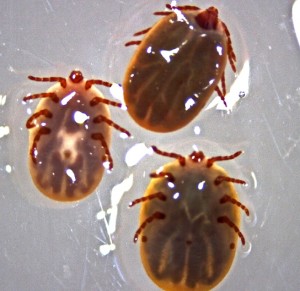Species known to be carrier of infectious livestock disease, officials say

Inspectors at Philadelphia International Airport intercepted the area’s first Anatolian brown ticks last month, according to the U.S. Department of Homeland Security.
The U.S. Department of Agriculture (USDA) confirmed Thursday, Jan. 16, the area’s first interception of Anatolian brown ticks, a known carrier of infectious livestock diseases, at Philadelphia International Airport last month.
U. S. Customs and Border Protection (CBP) agriculture specialists discovered the ticks on untanned ruminant hides that a passenger brought from Macedonia and Greece, according to a U.S. Department of Homeland Security news release.
The USDA further reported that this is only the nation’s fourth documented interception of Anatolian brown ticks. This species was previously intercepted at John F. Kennedy International Airport in 1966 on a live horse imported from Italy; on trophy hides of Spanish goats that arrived at Minneapolis-St. Paul International Airport in 1995; and trophy hides of four big game species from Spain that arrived at JFK International Airport in July 2010, the release said.
According to the USDA, this tick occurs commonly in most countries surrounding the Mediterranean Sea and in the Middle East. All active life stages (adult and immature) feed on the same hosts, which most commonly are larger hoofed mammals. This tick is a known vector of infectious diseases of cattle, sheep, and horses. It also may cause tick paralysis in sheep, and it may occasionally bite humans.
The passenger, who arrived from Rome on Dec. 23, was referred to a secondary agriculture inspection after he reported possessing goatskins. During close examination, CBP agriculture specialists discovered that the hides were heavily infested with both live and dead ticks.
CBP submitted seven live ticks to the USDA tick specialist for identification, the release said. On Dec. 31, the USDA tick specialist determined the ticks to be Rhipicephalus bursa (Ixodidae), commonly known as Anatolian brown ticks. CBP agriculture specialists destroyed the ruminant hides, the release said.
“Customs and Border Protection agriculture specialists take their job of detecting dangerous insect pests very seriously, and any introduction of potential animal disease to the U.S. livestock industry is of grave concern to us,” said Tarance Drafts, Acting CBP Port Director for the Port of Philadelphia. “This is an excellent example of our agriculture specialists performing a thorough inspection and finding a new potential threat to U.S. agriculture.”
CBP agriculture specialists have extensive training and experience in the biological sciences and agricultural inspection. On a typical day, they inspect tens of thousands of international air passengers, and air and sea cargoes nationally being imported to the U.S., seize 4,380 prohibited animal products and plant materials, and intercept 440 agriculture insect pests and diseases. To learn more about CBP agriculture specialists, please visit http://www.cbp.gov/xp/cgov/careers/customs_careers/ag_spec/.




What has been known and denied for years now – Ticks do travel whether its plane, on your dog, your stuff when your moving. Tick borne illness is a problem in every state and as longer as denial is proliferated – the longer the citizens of the United States have the potential of becoming one of the untreatable form of lyme disease. CDC has responsibility here.